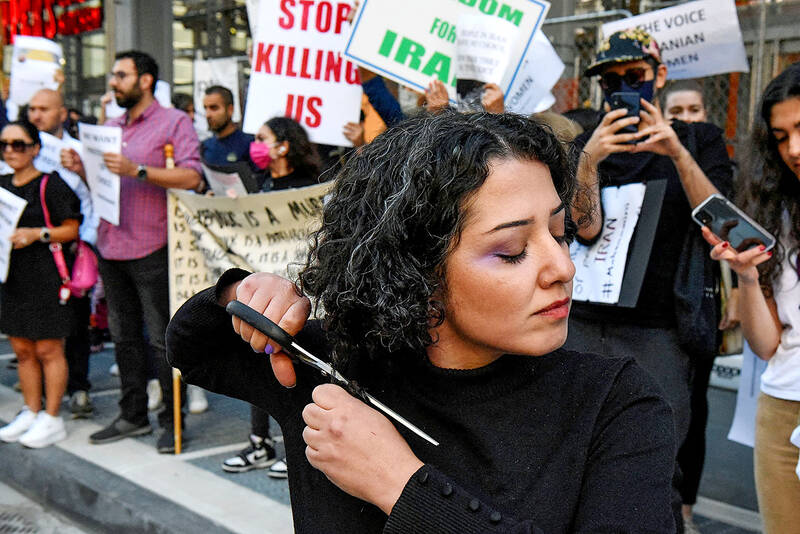From the Russian invasion of Ukraine to the overturning of abortion laws in the US, here is a roundup of the biggest events to mark the past year.
WAR IN UKRAINE
Russian President Vladimir Putin launches the biggest invasion in Europe since World War II when he sends troops into Ukraine on February 24, causing millions of Ukrainians to flee abroad.

Photo: AP
The West imposes unprecedented sanctions on Moscow and sends billions of dollars in aid to Ukraine. Russian forces failed to capture the capital, Kyiv, and topple the government of President Volodymyr Zelensky. In the south, Russian forces capture most of Ukraine’s Black Sea coastline, including the port of Mariupol, which is destroyed in a three-month siege.
In April, Russian forces are accused of massacring scores of civilians in the Kyiv suburb of Bucha.
By September, Ukrainian forces are regaining ground in the northeast and south. Putin hastily annexes four Ukrainian regions partly controlled by Russia, a move condemned as illegal by the United Nations.

Photo: Reuters
Last month, Russian forces retreat from the southern port of Kherson, ending an eight-month occupation. As the year ends, Russian strikes relentlessly batter Ukraine’s energy infrastructure, causing power cuts across the country as winter sets in.
This month, on his first overseas trip since the invasion, Zelensky goes to Washington to address US Congress, appealing for long-term US support.
NIGHTMARE ON DOWNING STREET

Photo: Reuters
Britain gets its fifth conservative prime minister in six years. Rishi Sunak takes office in October after his tax-cutting predecessor Liz Truss self-combusts in just 44 days — the shortest-ever tenure for a British leader.
Truss’s lightning fall from grace, sparked by a disastrous mini budget, caps a tumultuous 2022 in Britain. The year is marked by the death of its longest-serving monarch, Queen Elizabeth II, at the age of 96 and the forced resignation of Brexiteer premier Boris Johnson after a series of scandals.
US ABORTION SHOCK
The US Supreme Court causes global shock waves in June when it overturns its landmark 1973 “Roe v Wade” decision, which enshrined a constitutional right to abortion nationwide, returning the issue to individual states.
Following the ruling, abortion bans are brought in by Republicans in 16 US states, home to 26.5 million women.
The issue impacts last month’s midterms, as US voters in several states side with candidates advocating access to abortion.
XI CEMENTS CONTROL, PIVOTS ON COVID
President Xi Jinping (習近平) cements his control at the helm of China after winning a historic third term last month as leader the world’s second-largest economy.
But the Chinese lose patience with the snap lockdowns, mass testing and curbs on movement imposed by the government’s signature zero-COVID strategy. Hundreds of people take part in protests against the restrictions in Beijing, Guangzhou, Shanghai, Urumqi, Wuhan and other cities. Some even dare to call for Xi’s resignation.
China’s warplane incursions into Taiwan’s air defense zone skyrocket while Beijing holds the largest military exercises in decades around the self-ruled island, raising alarm in Taipei. Beijing this month announces a loosening of its zero-COVID policy, ending large-scale lockdowns and allowing some positive cases to isolate at home.
It also says quarantine measures for overseas arrivals will be scrapped in the New Year.
HEATWAVE AFTER HEATWAVE
Europe swelters through the hottest summer in its recorded history, with the mercury topping 40 degrees Celsius for the first time in Britain. Parts of the Arctic and Antarctic, China and the US also experience record temperatures.
Extreme weather events linked to climate change continue to wreak havoc in developing countries.
Flooding in Pakistan affects vast swathes of the country, Nigeria suffers its worst floods in a decade and parts of drought-hit Somalia face the threat of famine.
At the UN climate summit in Egypt (COP27), developing nations finally succeed in getting wealthy polluters to agree to pay into a “loss and damage” fund to compensate poorer countries for climate damage.
INFLATION BITES
The invasion of Ukraine and resulting sanctions on Russia create an energy crisis of a magnitude unseen in half a century, with costs for gas and electricity soaring globally.
Britain sees its energy bills double over the space of a year. Soaring energy prices are also a factor in Sri Lanka’s cost-of-living crisis, which in August forces then-president Gotabaya Rajapaksa to flee abroad.
Inflation soars globally, prompting central banks to aggressively hike interest rates, raising fears of another major debt crisis.
FAR-RIGHT ON THE MARCH
The far-right makes unprecedented gains in Europe. Voters in Italy elect their most right-wing leader since World War II in post-fascist firebrand Giorgia Meloni.
The anti-immigration Sweden Democrats are the big winners of a general election that brings conservatives to power in that country.
In France, a surge by both the far right and hard left strips center-right President Emmanuel Macron of his parliamentary majority.
But in Latin America, the right is in decline. Veteran left-winger Luiz Inacio Lula da Silva makes a stunning comeback in Brazil, ousting far-right incumbent Jair Bolsonaro. Left-wing leaders also come to power in Colombia and Honduras.
IRAN’S GREAT UNVEILING
In Iran, the death of 22-year-old Mahsa Amini following her arrest for alleged violations of the country’s Islamic dress code sparks the biggest protests in years. On the street and on social media women and girls defiantly remove their headscarves in an unprecedented challenge to the country’s clerical leadership.
Iran seeks to quell the protests by sentencing some of the protesters to death.
On Dec. 8, Mohsen Shekari, 23, becomes the first person executed by authorities over the protests. Four days later Majidreza Rahnavard, 23, is hanged in public.
The Oslo-based monitor Iran Human Rights on Dec. 19 says Iran’s security forces have killed at least 469 people in the protests while at least 14,000 people have been arrested, according to the UN.
PEACE IN ETHIOPIA
After two years of conflict that have killed untold numbers of civilians and led to near-famine conditions in Tigray, Ethiopia’s government and Tigrayan rebels agree on a landmark peace deal.
The agreement allows critical humanitarian aid to resume to the northern region.
WORLD CUP IN THE DESERT
Controversy mars the run-up to the Middle East’s first football World Cup.
Some fans boycott the tournament in Qatar over concerns about human rights and the high number of deaths among migrant workers involved in constructing eight new stadiums.
The decision by the conservative Islamic kingdom to ban alcohol from stadiums also leaves a bitter taste but as the tournament progresses, attention shifts to the on-pitch drama.
In an extraordinary finale, Lionel Messi clinches the title that had eluded one of the greatest players of all time, leading Argentina to victory against France in a penalty shootout triumph after an epic match ends 3-3.

On April 26, The Lancet published a letter from two doctors at Taichung-based China Medical University Hospital (CMUH) warning that “Taiwan’s Health Care System is on the Brink of Collapse.” The authors said that “Years of policy inaction and mismanagement of resources have led to the National Health Insurance system operating under unsustainable conditions.” The pushback was immediate. Errors in the paper were quickly identified and publicized, to discredit the authors (the hospital apologized). CNA reported that CMUH said the letter described Taiwan in 2021 as having 62 nurses per 10,000 people, when the correct number was 78 nurses per 10,000

As we live longer, our risk of cognitive impairment is increasing. How can we delay the onset of symptoms? Do we have to give up every indulgence or can small changes make a difference? We asked neurologists for tips on how to keep our brains healthy for life. TAKE CARE OF YOUR HEALTH “All of the sensible things that apply to bodily health apply to brain health,” says Suzanne O’Sullivan, a consultant in neurology at the National Hospital for Neurology and Neurosurgery in London, and the author of The Age of Diagnosis. “When you’re 20, you can get away with absolute

When the South Vietnamese capital of Saigon fell to the North Vietnamese forces 50 years ago this week, it prompted a mass exodus of some 2 million people — hundreds of thousands fleeing perilously on small boats across open water to escape the communist regime. Many ultimately settled in Southern California’s Orange County in an area now known as “Little Saigon,” not far from Marine Corps Base Camp Pendleton, where the first refugees were airlifted upon reaching the US. The diaspora now also has significant populations in Virginia, Texas and Washington state, as well as in countries including France and Australia.

May 5 to May 11 What started out as friction between Taiwanese students at Taichung First High School and a Japanese head cook escalated dramatically over the first two weeks of May 1927. It began on April 30 when the cook’s wife knew that lotus starch used in that night’s dinner had rat feces in it, but failed to inform staff until the meal was already prepared. The students believed that her silence was intentional, and filed a complaint. The school’s Japanese administrators sided with the cook’s family, dismissing the students as troublemakers and clamping down on their freedoms — with